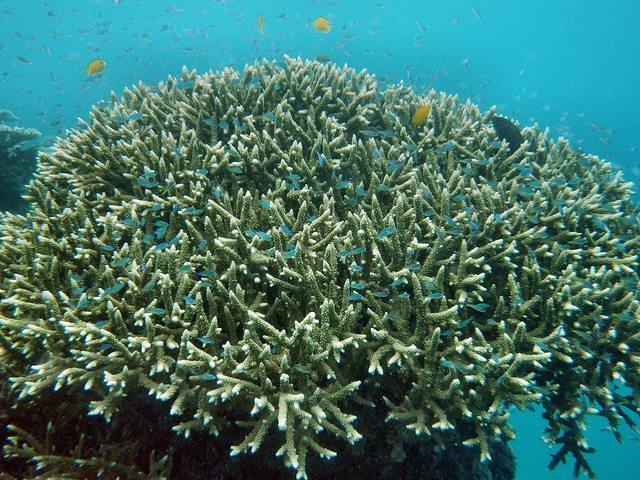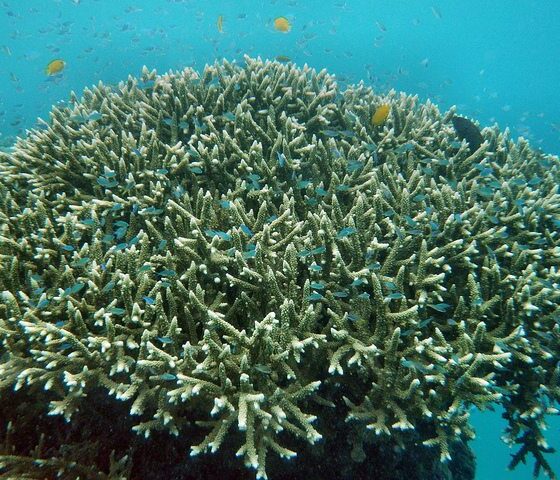

Environment
BlackRock adds voice to investor concerns about coal and gas risk to Great Barrier Reef
Investors worried about the impacts of coal and natural gas projects on Australia’s Great Barrier Reef could consider divesting from the companies involved, a senior BlackRock employee has said.
Speaking to Bloomberg News, Pru Bennett, the regional director of corporate governance and responsible investment at the leading asset management firm, became the latest commentator to express concern over projects planned near the reef.
Plans are in place for about $65 billion of liquefied natural gas (LNG) and coal terminal developments on Australia’s north-east coast. While the companies behind the construction insist the environmental impact will be minimal, critics remain unconvinced.
The approved expansion of the port at Abbot Point, a project that will require 3m tonnes of dredged spoil to be dumped in Great Barrier Reef marine park waters, has proved particularly controversial.
“It’s a huge issue potentially for any company operating in the Great Barrier Reef if there is a failure of management systems from an environmental perspective”, Bennett said.
“The reputational damage that could be done, and the potential to lose that social license to operate, is very high.”
Bennett suggested that portfolio managers could sell active holdings in companies they deemed to be acting irresponsibly with regards to environmental risk.
Ian Woods, head of environmental, social and governance (ESG) at the Sydney-based investment manager AMP Capital, added, “Fund managers have been looking at the whole range of environmental and social issues associated with the LNG plants.”
“We need to think about what are our exposures to longer-term risk.”
Such developments are only one of the threats that the reef, the planet’s largest living structure, currently faces.
A report released on Monday by the UN Intergovernmental Panel on Climate Change (IPCC), summarising the likely impacts of climate change, warned that the reef could be irreparably damaged within 25 years unless more is done to cut carbon emissions.
Felicity Wishart, a campaign manager at the Australian Marine Conservation Society, said that banning offshore dredging projects and introducing stricter criteria for future developments in the area could help protect the unique ecosystem.
“The last thing the reef needs as it struggles with the impacts of climate change is the additional pressure from industrial activity,” she said.
Concern is growing over the future security of marine ecosystems, not just for the sake of aquatic life but also for the sustainability of humanity’s food supply.
The UN Food and Agriculture Organisation (FAO) estimates than one in five people worldwide depend on fish as their primary source of protein.
Experts warn that over 70% of the world’s fisheries are “fully exploited”, “over exploited” or “significantly depleted”.
A project recently launched by a grant from former New York City mayor Michael Bloomberg’s philanthropic foundation has called on investors to join the fight to protect marine life.
New York-based investment firm EKO Asset Management Partners is to develop a blueprint showing how investors can fund schemes that compensate fishermen who will lose income while fishing stocks are allowed to recover, and then take a share of the improved returns that should be formed once fish stocks rise.
Further reading:
The IPCC’s stark warning: no nation will be untouched by climate change
Ocean acidification will threaten fish stocks
John Kerry: degradation of marine environment ‘doesn’t know borders’
Oceans acidifying at ‘unprecedented rates’ because of manmade CO2
Bloomberg’s philanthropic grant to recruit investors in fight against overfishing


 Environment12 months ago
Environment12 months agoAre Polymer Banknotes: an Eco-Friendly Trend or a Groundswell?

 Features11 months ago
Features11 months agoEco-Friendly Cryptocurrencies: Sustainable Investment Choices

 Features12 months ago
Features12 months agoEco-Friendly Crypto Traders Must Find the Right Exchange

 Energy11 months ago
Energy11 months agoThe Growing Role of Solar Panels in Ireland’s Energy Future





























